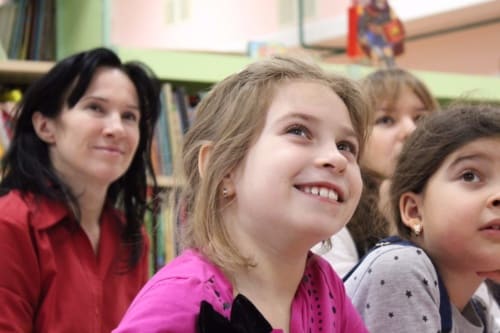Table of Contents
https://vimeo.com/
Identifying and supporting the gifted student in the classroom
By Todd Stanley
There are many tests that can be given to identify a student as gifted. There are cognitive tests such as the OLSAT and Terra Nova. There are subject specific tests such as the Stanford. There are some states and districts that use checklists or local norms such as grades and parent recommendations in order to identify students as gifted. But any teacher who has been in gifted education for a number of years can usually spot these gifted students using only the eyeball test. Gifted students have certain characteristics, certain quirks that cause their giftedness to be revealed without needing the test to indicate this. What are some of these characteristics?
Intellectual curiosity
Being gifted means more than simply being smart. It means being intellectually curious about things. Why is that the way it is? How does that work? What would happen if something different occurred? These are the sorts of questions a gifted student would ask. Sometimes it comes off as though the child is questioning the authority of the teacher, but this child is just questioning everything. This is the sort of student who takes something apart just to see what it is like inside or who wants to explore something further when it seems to everyone else the correct answer has been given.
Quirky sense of humor
 Gifted students often have a sense of humor many years beyond their tender age. They will find things funny that classmates will not, and not find things funny their classmates do. They have more of an adult sense of humor. This does not mean they like humor with foul language. It means they have a more sophisticated sense of what is funny. While a classmate might find humor in a poop joke, a gifted student may find a pun funny that other children do not understand. Sarcasm is a good indicator of being gifted as sarcasm is very abstract while most young children think in a very concrete manner.
Gifted students often have a sense of humor many years beyond their tender age. They will find things funny that classmates will not, and not find things funny their classmates do. They have more of an adult sense of humor. This does not mean they like humor with foul language. It means they have a more sophisticated sense of what is funny. While a classmate might find humor in a poop joke, a gifted student may find a pun funny that other children do not understand. Sarcasm is a good indicator of being gifted as sarcasm is very abstract while most young children think in a very concrete manner.
Desire to talk to teachers and adults more than students
Often times because of their intellectual abilities, gifted students have difficulty finding peer-mates. This is because they are put into classes based on age. This makes it a challenge to find someone who is on the same level as themselves so many times the child turns to adults because they can have a conversation with them. This may result in students hanging out with the teacher during class or conversing with the lunch duty aide instead of eating with classmates. It does not mean they are socially awkward although it can come across as that. It just means they have difficulty connecting with children their own age.
Well spoken
There is a certain way many gifted students speak that is not representative of their age. It can sometimes mean a larger use of vocabulary but not always. It just means when they speak they do so with a sense of clarity others the same age lack. Because they have so many ideas in their head, their mouth can barely keep up with their brain, so they tend to speak quickly. Although not always, many gifted children talk too much because it allows them to show off just how smart they are.
Looks at things from another angle
 One of the biggest indicators of a gifted child is not that they are getting the correct answer all the time. It is that they are looking at the problem in an entirely different way. These are students who create their own math in order to solve a problem. It might not be as efficient as the way the rest of the class is doing it, but it makes sense to that child. Sometimes the most obvious answer is the least creative. Many gifted children use their creative abilities when providing an answer which makes it difficult in a classroom where there is only one correct answer. These students like to think which results in them seeing many possibilities.
One of the biggest indicators of a gifted child is not that they are getting the correct answer all the time. It is that they are looking at the problem in an entirely different way. These are students who create their own math in order to solve a problem. It might not be as efficient as the way the rest of the class is doing it, but it makes sense to that child. Sometimes the most obvious answer is the least creative. Many gifted children use their creative abilities when providing an answer which makes it difficult in a classroom where there is only one correct answer. These students like to think which results in them seeing many possibilities.
Strong sense of fairness and justice
Many gifted children have difficulty moving on when they believe something is not fair, whether real or perceived. It can be something as simple as a friend got one more piece of bubble gum than them or something larger such as having to go to school when they feel it should have been a snow day. This strong sense of justice can also lead to having high expectations not just of themselves, but of those around them. If a classmate is not living up to these high standards, the gifted child thinks this is unfair as well. This is why they sometimes have difficulty working with others.
False identifiers
 Some teachers think that a gifted child is one who is a compliant child who answers lots of questions in class, turns in assignments, gets good grades, and is the model student. This is not necessarily the gifted child. This is the bright child. There is a difference between these two. The biggest difference is that gifted students think more critically. If you ask an open-ended question, the bright child will usually give the most obvious, although correct answer. The gifted child may come up with a solution that even you did not think of. The gifted child might not be getting grades that are indicative of their abilities either because they are bored or they are so poorly organized they lose assignments.
Some teachers think that a gifted child is one who is a compliant child who answers lots of questions in class, turns in assignments, gets good grades, and is the model student. This is not necessarily the gifted child. This is the bright child. There is a difference between these two. The biggest difference is that gifted students think more critically. If you ask an open-ended question, the bright child will usually give the most obvious, although correct answer. The gifted child may come up with a solution that even you did not think of. The gifted child might not be getting grades that are indicative of their abilities either because they are bored or they are so poorly organized they lose assignments.
It is not as though all gifted students have all of these characteristics nor does it mean there are not non-gifted children who possess some of them. But if a child exhibits a few of these, they may be gifted. These are not a sure-fire recipe for spotting a gifted student nor should it be used as a method to identify gifted children. It can, however, enable you to create a pool of students who may need to be tested for giftedness.
Sometimes these students may slip through the cracks and need someone to plead their case. If you spot a student with one or more of these characteristics, recommend to your gifted coordinator or school psychologist that this child be tested for giftedness. It is important as a teacher that you are familiar with how your district goes about identifying gifted children as different districts and states have different methods. Depending on how gifted is tested in your district, you might be the only advocate this child has.
Author
Todd Stanley is the author of several education books including Project-Based Learning for Gifted Students and Performance-Based Assessment for 21st-Century Skills, both for Prufrock Press.
Additionally, he wrote a series of workbooks for them entitled 10 Performance-Based Projects for the ELA/Math/Science Classroom. He wrote Creating Life-Long Learners with Corwin Press and is a regular contributor of blogs to Corwin Connect which can be accessed at https://corwin-connect.com/author/toddstanley/. You can find out more about Todd at MyEdExpert.com
- edCircuit – Inquiry: Don’t Take No (or Yes) For an Answer
- CBS Philly – School District Introduces New Method Of Identifying Gifted Students
- The Atlantic – Schools Are Missing What Matters About Learning





